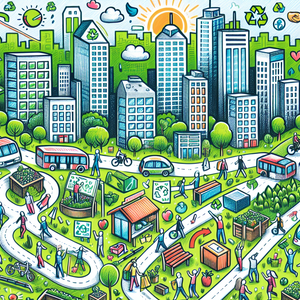The Environmental Impact of the iPhone 16

A key advancement in the iPhone 16 is the incorporation of recycled materials, which significantly reduces the environmental impact of smartphone production. According to Apple’s Environmental Progress Report, an impressive 75% of the aluminum used in the iPhone 16 is sourced from recycled materials. This shift not only minimizes the need for new mining operations—which can be ecologically damaging—but also lowers greenhouse gas emissions associated with the extraction and processing of virgin materials. Moreover, Apple has committed to using recycled rare earth elements in the components of the iPhone 16. These materials, often associated with harmful mining practices, contribute to Apple’s efforts to lessen its environmental footprint. By prioritizing sustainable materials, Apple sets an industry benchmark, encouraging other manufacturers to adopt similar practices and foster a culture of responsible sourcing.
Manufacturing Processes
The environmental impact of the iPhone 16 also extends to its manufacturing processes, which are designed to minimize carbon emissions. Apple has made remarkable investments in renewable energy, and as of 2023, all of its global facilities, including manufacturing plants, operate on 100% renewable energy. This commitment significantly reduces the carbon footprint associated with the production of each device. In addition to renewable energy, Apple emphasizes sustainable supply chain practices by partnering with suppliers who share its environmental ethos. The company has instituted rigorous standards to ensure that suppliers reduce waste and emissions throughout the production cycle. For instance, many suppliers have begun adopting greener manufacturing techniques and technologies, which not only benefit the environment but also enhance the overall sustainability of the iPhone 16.
Recycling and End-of-Life Programs
Apple's commitment to sustainability is further demonstrated through its comprehensive recycling initiatives aimed at reducing electronic waste. The company's trade-in program allows customers to return their old devices, which can be refurbished, resold, or recycled. By employing innovative recycling technologies, such as the Daisy robot, Apple can disassemble devices efficiently and recover valuable materials for reuse in new products. The iPhone 16 has been designed with recyclability in mind, featuring components that can be easily removed, thus streamlining the recycling process. Apple’s ambition is to create a closed-loop supply chain where products are made entirely from recycled or renewable materials, thereby minimizing the extraction of finite resources and reducing electronic waste.
Broader Implications for the Tech Industry
The environmental impact of the iPhone 16 has far-reaching consequences beyond its immediate production and usage. By establishing high sustainability standards, Apple influences the broader tech industry to adopt eco-friendly practices. Competitors are increasingly recognizing the significance of sustainability, leading to changes in the design, manufacturing, and disposal of their devices. Furthermore, consumers are becoming more discerning about their purchases, often favoring brands that prioritize environmental responsibility. This shift in consumer behavior not only drives demand for sustainable products but also motivates companies to innovate and improve their environmental practices. As consumers seek out eco-conscious options, the tech industry is compelled to adapt, further amplifying the positive impact on the environment.
The iPhone 16 stands as a testament to Apple’s commitment to sustainability, characterized by its use of recycled materials, renewable energy in manufacturing, and comprehensive recycling initiatives. As the tech industry grapples with its environmental responsibilities, Apple’s efforts serve as a model for how companies can harmonize innovation with ecological stewardship. The iPhone 16 is not merely a smartphone; it represents a significant stride toward a more sustainable future in technology, encouraging both consumers and manufacturers to contemplate the environmental implications of their choices. Moving forward, the challenge remains to maintain this momentum and ensure that sustainability continues to take center stage in the evolution of technology.
Sustainability Analyst
Apple, Google, Microsoft
Core Responsibilities
Analyze environmental data to assess the sustainability practices of products and processes within the tech industry.
Develop reports and recommendations for improving sustainability metrics and compliance with environmental regulations.
Required Skills
Proficiency in data analysis tools (e.g., Excel, SQL, or Python).
Strong understanding of environmental science and sustainability practices.
Common Employers
Tech companies like Apple, Google, and Microsoft, as well as consulting firms specializing in sustainability.
Environmental Engineer
Manufacturing companies, environmental consulting firms, governmental agencies
Core Responsibilities
Design and implement systems and processes to reduce environmental impacts during product manufacturing.
Collaborate with cross-functional teams to ensure compliance with environmental regulations and standards.
Required Skills
A degree in Environmental Engineering or a related field; professional engineering license preferred.
Knowledge of sustainable materials and waste management practices.
Common Employers
Manufacturing companies, environmental consulting firms, and governmental agencies focused on environmental protection.
Product Sustainability Manager
Consumer electronics firms
Core Responsibilities
Lead initiatives to integrate sustainable materials and practices into product development cycles.
Collaborate with marketing and design teams to promote environmentally-friendly products.
Required Skills
Experience in product lifecycle assessment and familiarity with eco-certifications (e.g., Energy Star, EPEAT).
Strong project management skills and ability to communicate sustainability goals to stakeholders.
Common Employers
Consumer electronics firms and companies committed to sustainable product development.
Renewable Energy Specialist
Energy companies, tech firms, governmental or non-profit organizations
Core Responsibilities
Conduct feasibility studies for renewable energy projects and assess their impact on production operations.
Work with management to implement renewable energy solutions and monitor their effectiveness.
Required Skills
Expertise in renewable energy systems (solar, wind, etc.) and energy efficiency practices.
Strong analytical skills and the ability to interpret energy consumption data.
Common Employers
Energy companies, tech firms with sustainability goals, and governmental or non-profit organizations focused on climate change initiatives.
Recycling Program Coordinator
Technology firms, recycling companies, environmental organizations
Core Responsibilities
Oversee recycling initiatives and programs aimed at reducing electronic waste within the company.
Develop and promote educational materials to inform consumers about recycling options and sustainability practices.
Required Skills
Experience in waste management systems and knowledge of recycling processes specific to electronics.
Strong communication and organizational skills to coordinate various programs and outreach efforts.
Common Employers
Technology firms, recycling companies, and environmental organizations advocating for sustainable practices.


